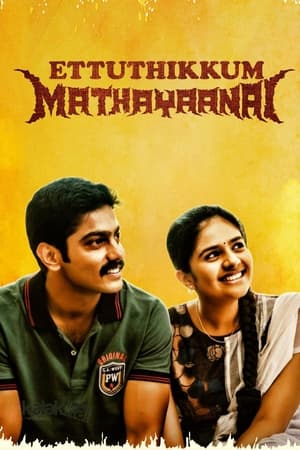
Ettuthikkum Madhayaanai
As with his first film Raattinam, KS Thangasamy opens Ettuthikkum Mathayaanai with an act of violence. We see a CCTV recording (the year is 2009) of a young man being beaten to death but then the film moves forward the present and we see Natesan aka Natty and his family shifting to Tirunelveli. And for the next hour or so, all that we get are his romance with Sarah, a hostess for the local cable channel. Then, Natty's dad, a cop, is murdered by an unknown gang and the interval twist reveals us that it was Tamizhselvan, the brother of Natty's dead friend Prabha, who also lives in the town. And, he is planning something even bigger! Tamizh's grudge has something to do with Prabha's death and how Natty becomes a part of it is what the rest of the plot is all about. As was evident in his debut, Thangasamy is a low-key filmmaker and many of the incidents in this film play at a pitch that is lower than what we would normally find in our films. Take for example the manner in which Sarah's family gets to know of the romance. Tamizh's wife, who is a supporter of the lovers, arranges for a meeting between their mothers and broaches the subject. Natty's mother tells her view and Sarah's mother expresses her reservations and then she decides to check with her husband. There is none of the shouting and name-calling that we are used to in most films involving lovers from different religion. Similarly, when Natty's father dies, the family just tries to move on. As we saw with Thirudan Police some months earlier, Natty gets his father's job and becomes a cop but the young man doesn't brood over the loss or plot revenge. He just keeps doing his day-to-day work. This kind of pragmatism is what makes Ettuthikkum Mathayaanai refreshing but it is also the reason why the film doesn't seem as exciting as it should. Also, too much time is spent on the romantic track between Natty and Sarah, which essentially should have been a sub-plot. There is even an overlong episode involving a migrant worker that seems to have been included only to show that our attitudes towards these people need to be changed. Interestingly, this is the second film this week (after Kaaki Sattai) to touch upon this subject. Thus, the juicier revenge angle feels rushed and the villain's character seems underwritten. As in Raattinam, the acting leaves much to be desired (the lip sync is even worse) and we wonder how better actors might have shaded these characters. The lively score by Manu Ramesan props up the scenes to a large extent but as we exit, we can't help feeling underwhelmed.
